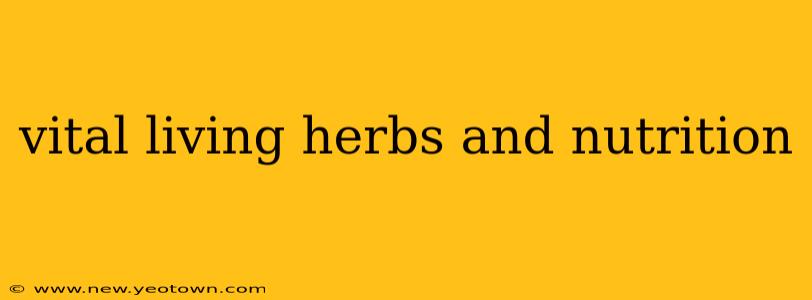For centuries, humans have harnessed the power of nature to bolster health and well-being. From ancient healers to modern nutritionists, the understanding of herbs and their nutritional benefits continues to evolve. This isn't just about trendy superfoods; it's about understanding the fundamental connection between the plants we consume and the vitality we experience. This journey explores vital living herbs and their nutritional power, revealing how these natural allies can support a vibrant and healthy life.
What are some of the most vital herbs for health?
This isn't a simple question with a simple answer! The "most vital" herbs depend heavily on individual needs and health goals. However, some consistently stand out for their wide range of benefits and historical use:
-
Ginger: Known for its anti-inflammatory properties, ginger aids digestion, soothes nausea, and even boasts potential benefits for reducing muscle soreness. Its pungent zing adds a flavorful kick to countless dishes.
-
Turmeric: The vibrant yellow spice contains curcumin, a powerful antioxidant and anti-inflammatory compound. Turmeric has been linked to improved brain function, reduced risk of heart disease, and even potential cancer-fighting properties.
-
Garlic: A culinary staple with potent medicinal uses, garlic possesses antimicrobial and antiviral properties. It's been associated with improved heart health and immune function.
-
Echinacea: This purple coneflower is famous for its immune-boosting capabilities. Traditionally used to fight colds and flu, echinacea stimulates the body's natural defenses.
-
Ginseng: A revered adaptogen, ginseng helps the body cope with stress. It's often used to boost energy levels, enhance cognitive function, and improve overall well-being.
How can herbs improve my nutrition?
Herbs significantly enhance nutrition by adding a wealth of vitamins, minerals, and bioactive compounds often missing from a standard diet. Many herbs are excellent sources of antioxidants, protecting cells from damage caused by free radicals. They also offer a variety of phytonutrients—plant-based compounds with various health-promoting effects. Adding herbs to your meals provides a delicious and effective way to boost your nutritional intake.
What are the benefits of incorporating herbs into my daily diet?
The benefits are numerous and far-reaching:
-
Improved Digestion: Many herbs, like ginger and peppermint, aid digestion and relieve common digestive complaints.
-
Boosted Immunity: Herbs like echinacea and elderberry support the immune system, helping the body fight off infections.
-
Reduced Inflammation: Turmeric and ginger possess potent anti-inflammatory properties, beneficial for various health conditions.
-
Enhanced Energy Levels: Adaptogenic herbs like ginseng and rhodiola help the body manage stress and improve energy levels naturally.
-
Improved Mental Clarity: Certain herbs, such as rosemary and sage, are associated with improved cognitive function and memory.
Are there any risks associated with using herbs?
While generally safe, herbs can interact with medications or cause allergic reactions in some individuals. It's crucial to consult a healthcare professional before using herbs, especially if you have underlying health conditions or are taking medication. Always purchase herbs from reputable sources to ensure quality and purity.
How do I choose and use herbs safely and effectively?
Choosing high-quality herbs from reputable suppliers is paramount. Look for organically grown herbs whenever possible. Start with small amounts to assess any potential reactions and gradually increase your intake. Experiment with different herbs to find those that best suit your tastes and needs.
What are some simple ways to incorporate herbs into my meals?
The possibilities are endless! Add fresh herbs to salads, soups, stir-fries, and smoothies. Use dried herbs in baked goods, stews, and sauces. Experiment with herbal teas for a soothing and flavorful beverage. The key is to find creative ways to integrate herbs into your daily culinary routine.
The world of herbs and nutrition is vast and exciting. By understanding the unique benefits of various herbs and incorporating them thoughtfully into your diet, you can unlock a pathway to a more vibrant and healthier life. Remember, consulting with a healthcare professional or registered dietitian can provide personalized guidance to ensure you’re using herbs safely and effectively for your individual needs.

